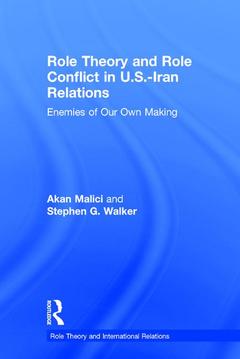Description
Role Theory and Role Conflict in U.S.-Iran Relations
Enemies of Our Own Making
Role Theory and International Relations Series
Authors: Malici Akan, Walker Stephen G.
Language: English
Subject for Role Theory and Role Conflict in U.S.-Iran Relations:
Keywords
Role Theory; Foreign Policy; International Relations; International Security; International Relations Theory; Research Methodology; International Politics; Conflict; U.S.-Iranian Relations; Middle East Politics; World Politics; Stephen G; Walker; Akan Malici; George Herbert Mead; Howard Baskerville; The Strangling of Persia; Mohammad Mosaddegh; The Islamic Revolution; Mohammad Reza Shah; Ayatollah Khomeini; Mohamad Khatami; The Clinton Administration; The Bush Administration; Hassan Rouhani; Joint Comprehensive Plan of Action (JCPOA); Power; Identities; National interests (PIN) Model; Brams Nonmyopic Equilibrium; National Role Conceptions; Binary Role Theory; Role Conceptions; Strategic Interaction Episodes; Role Location Process; United States; Mohammad Mossadegh; Role Transition Processes; Crucial Historical Episode; NME; Reza Shah; Congruence Score; Role Dyad; Subjective Games; Mohammad Khatami; Episode Number; Massoumeh Ebtekar; Client Patron Model; Rival Role; Oil Nationalization; Lower Left Cell; Khomeini; UK’s Role
184.47 €
In Print (Delivery period: 14 days).
Add to cartPublication date: 10-2016
· 15.2x22.9 cm · Hardback
Publication date: 10-2016
· 15.2x22.9 cm · Paperback
Description
/li>Contents
/li>Readership
/li>Biography
/li>
U.S.-Iran relations continue to be an international security problem in the Middle East. These two countries could have been friends, but instead they have become enemies. Stating this thesis raises the following questions: Why are the United States and Iran enemies? How and when did this relationship come to be? When the relationship began to deteriorate, could it have been reversed? What lessons can be learned from an analysis of past U.S.-Iranian relations and what are the implications for their present and future relations?
Akan Malici and Stephen G. Walker argue that the dynamics of U.S.-Iran relations are based on role conflicts. Iran has long desired to enact roles of active independence and national sovereignty in world politics. However, it continued to be cast by others into client or rebel roles of national inferiority. In this book the authors examine these role conflicts during three crucial episodes in U.S.-Iran relations: the oil nationalization crisis and the ensuing clandestine coup aided by the CIA to overthrow the Iranian regime in 1950 to 1953; the Iranian revolution followed by the hostage crisis in 1979 to 1981; the reformist years pre- and post- 9/11 under Mohammad Khatami from 1997 to 2002. Their application of role theory is theoretically and methodologically progressive and innovative in illuminating aspects of U.S.-Iran relations. It allows for a better understanding of the past, navigating the present, and anticipating the future in order to avoid foreign policy mistakes.
Role Theory and Role Conflict in U.S.-Iran Relations is a useful resource for international relations and foreign policy scholars who want to learn more about progress in international relations theory and U.S. relations with Iran.
1. Making Friends and Enemies in World Politics.
2. The Iranian Quest for Independence
3. Role Theory and U.S.-Iran Relations.
4. The Oil Nationalization Crisis and the Coup.
5. Remaking Patron-Client Relations.
6. The Iranian Revolution and the Hostage Crisis.
7. Making Enemies.
8. Iran’s New Leader and the September 11 Attacks.
9. Making Partners.
Appendices
Akan Malici is Associate Professor at Furman University. His teaching and research interests are in international relations, foreign policy analysis, and peace and conflict studies.
Stephen G. Walker is Professor Emeritus in the School of Politics and Global Studies at Arizona State University. His research interests focus on conflict management and resolution, foreign policy analysis, and political psychology.




